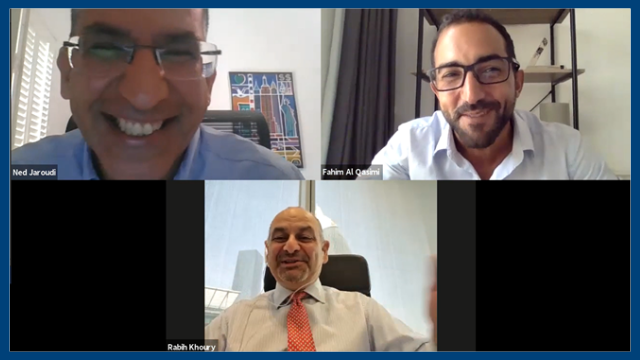Pearl Initiative’s Hosts Panel Discussion Which Sheds Light On The Importance Of Governance For SMEs

The Pearl Initiative(PI), a leading Gulf business-led non-profit organisation promoting a corporate culture of accountability and transparency, held a virtual panel to discuss the significance of establishing governance frameworks in the early stages of a business’ growth and why this is advantageous in attracting investment.
Moderated by Ned Jaroudi, Start-ups and Venture Capital Lead at Amazon Web Services (AWS), the panel discussion convened experienced investors and corporate governance experts; namely, Sheikh Fahim Al Qasimi, Partner at AQ&P and Rabih I. Khoury, Managing Partner & Chief Exit Officer at Middle East Venture Partners (MEVP).
Setting context for the discussion, Jaroudi highlighted the importance of strong governance and how it is noticed by shareholders, stakeholders, employees, and customers alike, and has a strong bearing on a company’s reputation. This in turn could lead to either a higher or a lower valuation of a company and thereby playing a critical role in attracting investors and capital to the company.
Results from a poll taken during the discussion suggested that the biggest challenge faced by Gulf companies trying to establish robust governance frameworks is the lack of clarity on which policies and procedures to embed first. Understanding the ‘rules of the game’ and how to adopt them is critical when attracting investors.
Taking this conversation forward, Al Qasimi, discussed essential steps in embedding a strong framework that is easy to introduce and financially viable to execute. “Governance is not a static process and needs to continue to evolve with your business. Start by establishing a Board that is committed to steering the company in the right direction. Record keeping is another governance component that is simple and yet so effective. It showcases the operational history of your organisation and is extremely insightful for someone who might want to buy or invest in your organisation”, Al Qasimi stated.
Khoury built on this by stating, “MSMEs looking to access investment need to embrace governance wholly. Not only do you need to have a governance playbook, but you also need to ensure that it is being applied. Governance adds value, not only from a valuation perspective, but also for the sustainability of the company. If governance is applied from the beginning, then it reduces the risk of transactions and protects the company and its shareholders in the long run.MSMEs can adopt emerging governance trends as they move forward through a post-pandemic environment. There is no one-size-fits-all solution, however, the basic governance tenets are obvious.”
He continued, “From an investor’s lens, diversity should bring in multiple perspectives and complementary expertise to help young companies make some very critical growth decisions. Business digitisation and accessible technology played a critical role in not collapsing economies globally during the pandemic. Small businesses should look to utilise the online space and digitise their operations to ensure business resilience during the next crisis”.
The impact of COVID-19stagnated business growth across the Gulf region. As businesses look to rebuild themselves, their priorities have shifted from short-term profitability to long-term business resilience. The Pearl Initiative’s Governance in MSMEs webinar series, ‘Building Better Businesses’, is targeted towards addressing the challenges and gaps in the MSME community by creating a business case for improved corporate governance.
Current programmes run by the Pearl Initiative include Anti-Corruption Best Practices, Diversity in Business Leadership, Governance in MSMEs, Governance in Family Firms, The Business Pledge, and Governance in Philanthropy.

